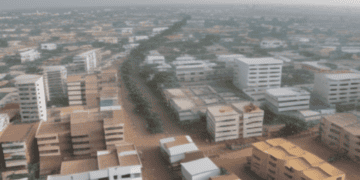In Accra, Ghana, residents are facing an increased cost of living, primarily attributed to the influx of the African diaspora following the successful ‘Year of Return’ initiative launched by President Nana Akufo-Addo in 2018. This initiative, designed to encourage people of African descent to visit and invest in Africa, particularly Ghana, has significantly impacted the local economy and lifestyle.
Francis Adotey, a 45-year-old pharmacist residing in the Osu neighborhood of Accra, highlighted the escalating prices in the area, which are becoming unaffordable for many locals. His monthly income of approximately $300 is insufficient for the increased costs, forcing him and his family to seek more affordable options outside Osu.
The ‘Year of Return’ and the subsequent ‘Beyond the Return’ project have attracted numerous visitors and permanent settlers from the diaspora, particularly African Americans. This influx has led to increased economic activity but also raised concerns among local residents about the rising prices and changing dynamics in their communities.
Local businesses, like the one owned by Ras Jomo, who sells African print fabrics and artefacts, benefit from the diaspora’s willingness to spend without bargaining, often leading to increased prices. However, this situation has put pressure on local residents, with many unable to afford everyday goods.
The real estate sector in Accra has been particularly affected, with an increased demand for properties from the diaspora. This demand has led to higher property prices and rents, often pegged in US dollars, causing displacement of local residents to suburban areas. Benjamin Kumah’s experience, where his rent in East Legon was increased from $111 to $800 per month, exemplifies this trend.
The booming real estate sector and the conversion of green spaces into residential properties have also contributed to environmental concerns and financial challenges in the city. Economist Daniel Anim Amarteye expressed concern about the economic implications, noting that the tendency to price houses in dollars adds to inflationary pressures.
The Ghanaian government, recognizing the benefits and challenges brought by the diaspora influx, has provided incentives and facilitated integration for those relocating to Ghana. This includes land acquisition and citizenship grants for long-term residents from the diaspora.
Erieka Bennett, head of the African Diaspora Forum, urged locals to see those from the diaspora as community members rather than merely financial opportunities. The Ghana Tourism Authority also emphasized the need for traders to be mindful of actions that could negatively impact the government’s diaspora engagement initiatives.
Ghana navigates its worst economic crisis in decades with a high inflation rate and reliance on a support program from the International Monetary Fund, the challenges of balancing the benefits of the diaspora influx with the rising cost of living for locals remain a critical concern for the future of Accra.
Your source for supply chain report news updates: The Supply Chain Report. For international trade insights and tools, head to ADAMftd.com.
#AccraCostOfLiving #YearOfReturn #BeyondTheReturn #AfricanDiaspora #GhanaEconomy #OsuAccra #RealEstateChallenges #GhanaTourism #RisingPropertyPrices #AffordableLiving #EconomicImpact #InflationInGhana #GhanaRealEstate #LocalBusinesses #CommunityIntegration #DiasporaInfluence #GhanaianEconomy #InternationalMonetaryFund #AfricanAmericanInAfrica #GhanaGovernment #CostOfLivingCrisis
















